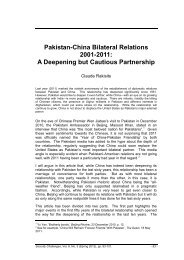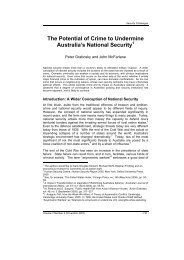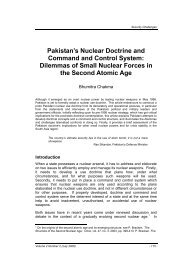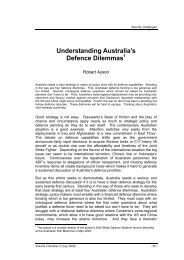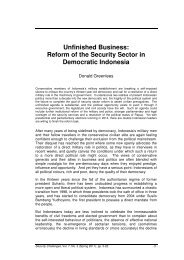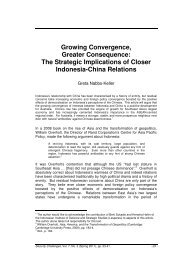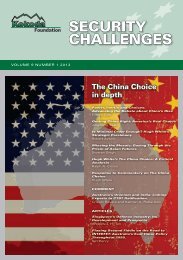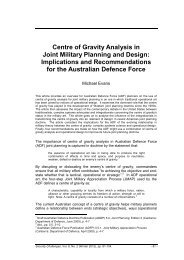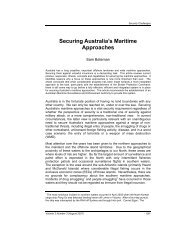The Transformation of Triad - Security Challenges
The Transformation of Triad - Security Challenges
The Transformation of Triad - Security Challenges
You also want an ePaper? Increase the reach of your titles
YUMPU automatically turns print PDFs into web optimized ePapers that Google loves.
Roderic Broadhurst and Lee King Wa<br />
activities <strong>of</strong> the Hung Mun societies led to their transformation to Hak She<br />
Wui 62 or the ‘dark’ or ‘black society’, 63 whose members <strong>of</strong>ten competed for a<br />
monopoly over illicit activities or a particular district and involved themselves<br />
in protection, mercenary violence, predatory crime and rebellion. 64<br />
Some triads have been able to exploit their association with patriotic activity<br />
to both disguise and justify the pursuit <strong>of</strong> illicit pr<strong>of</strong>its. This association was<br />
illustrated by the Minister <strong>of</strong> Public <strong>Security</strong>, People’s Republic <strong>of</strong> China<br />
(PRC) Tao Siju in 1992 who, as part <strong>of</strong> a ‘united front’ strategy, lauded the<br />
patriotic work <strong>of</strong> some triads and welcomed them to set up business in<br />
China—comments that coincided with investments in mainland China<br />
planned by Sun Yee On triad. 65 China adopted a ‘united front’ approach in<br />
the lead up to the resumption <strong>of</strong> Chinese sovereignty to engage the ‘patriotic’<br />
triads so as to ensure HK’s prosperity and stability, curtail penetration by<br />
Taiwanese organised crime (e.g. ‘United Bamboo’, ‘Four Seas’ 66 ) who might<br />
connect with anti-Beijing liberal groups, counter pro-democratic triad<br />
influence over local elections and avoid the triad-related violence that had<br />
damaged Macau’s reputation. 67<br />
A triad world-view may once have justified criminal acts and violence by<br />
identifying with jiang hu, which allows a life outside normal social customs<br />
and obligations. 68 Rituals such as the thirty-six oaths <strong>of</strong> loyalty and secrecy<br />
62 <strong>The</strong> authors prefer the translation <strong>of</strong> Hak as ‘dark’ in this context.<br />
63 In Mandarin usually rendered as Hei She Hui (underground society) or bang hui (gangster<br />
society) and traditionally referred to as the Hong [‘red’ in Cantonese but also ‘vast’ and usually<br />
rendered in English as triad] and Qing bang [green gang] secret societies. <strong>The</strong> green gang was<br />
usually associated with serving the Qing state and therefore seldom accepted by the Hong: see<br />
Wakeman, Policing Shanghai 1927-1937, p. 27; see also Pan Ling, Old Shanghai: Gangsters in<br />
Paradise (Singapore: Heinemann Asia, 1984) pp 17-33. <strong>The</strong> green gang was formed by the<br />
numerous boatmen <strong>of</strong> the Grand Canal who had become unemployed by the advent <strong>of</strong> steampower.<br />
64 C. Crisswell and M. Watson, <strong>The</strong> Royal Hong Kong Police, 1841-1945 (Hong Kong:<br />
Macmillan, 1982) pp 147-58; see generally, D. Murray, ‘Migration, Protection, and Racketeering:<br />
<strong>The</strong> Spread <strong>of</strong> the Tiandihui within China’, in Ownby and Heidhues (eds), Secret Societies<br />
Reconsidered; D. Ownby, ‘Introduction: Secret societies reconsidered’, in Ownby and Heidhues<br />
(eds.), Secret Societies Reconsidered; F. Wakeman, Policing Shanghai 1927–1937, pp. 25-39.<br />
65 See T. W. Lo, ‘Law and Order’, in Y. S. Cheng and C. K. Kwong (eds), <strong>The</strong> Other Hong Kong<br />
Report 1992 (Hong Kong: Chinese University Press, 1992), p. 141; Mei, ‘China’s Social<br />
Transition and Organized Crime: A Sociological Interpretation’, p. 213: fifty-four <strong>of</strong> the seventytwo<br />
martyrs in Huanghugang (in Canton) cemetery were triads associated with Sun Yet-sun’s<br />
campaign against the Qing.<br />
66 <strong>The</strong>se are relatively new groups formed in the late 1950s among the disaffected scions <strong>of</strong><br />
Nationalist military <strong>of</strong>ficers who had fled the mainland in 1949. <strong>The</strong>y rapidly adopted a business<br />
approach less territorial than the distinctive native Taiwanese crime groups: see Chin, Heijin:<br />
Organised Crime, Business and Politics in Taiwan, pp. 33-42.<br />
67 T. W. Lo, ‘Beyond Social Capital: A Case <strong>of</strong> <strong>Triad</strong> Financial Crime in Hong Kong and China’.<br />
See T. M. Liu, Hong Kong <strong>Triad</strong> Societies: Before and After 1997 (Hong Kong: Net e-Publishing,<br />
2001), pp. 114-5.<br />
68 K. L. Chin, Chinese Subculture and Criminality: Non-traditional Crime Groups in America<br />
(New York: Greenwood Press, 1990, pp 142-143; Pan Ling, Old Shanghai: Gangsters in<br />
Paradise, pp 19-20. <strong>The</strong> jiang hu (literally ‘river-lake’) concept implies a different way <strong>of</strong> life and<br />
- 10 - <strong>Security</strong> <strong>Challenges</strong>



